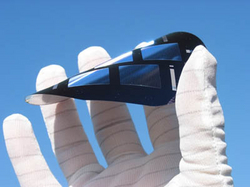First Solar makes a different kind of solar panel than most companies.
The panels they make are called thin film solar modules and they may just be a big part of solar power’s future.
Before we get to that, however, let’s take a quick look at the history of the company.
Way back in 1984 genius inventor Harold McMaster started a company called Glasstech Solar to produce low cost amorphous silicon solar panels.
After a few years, Harold decided that he was barking up the wrong tree and in 1990 he founded Solar Cells Inc. and switched to solar panels based on cadmium telluride technology.

Things went a little better this time and McMaster sold Solar Cells Inc. to True North Partners in 1999.
For those of you keeping score at home, True North Partners is owned by the Walton family of Wal-Mart fame.
Apparently the Waltons thought that Solar Cells Inc. could use a snappier name and the company became First Solar.
Now that we’ve got that little bit of corporate history out of the way, let’s get back to our thin film solar story:
The reason thin film solar panels could revolutionize the industry is that they could lower the cost of solar power. This is because these panels can be produced at a lower cost than traditional crystalline silicon solar panels.
Thin film panels don’t need to go through the same labor intensive manufacturing process that crystalline solar panels do.
Another bonus of thin film technology is that it is “less susceptible to cell temperature variations”. To understand what this means you need to know that solar panels get less efficient as they heat up.
Thin film panels are less affected by heat than crystalline solar panels so there is less of an “efficiency drop” as they warm up.
This can lead to better “real world” results.
As mentioned above, there is more than one kind of thin film technology. Of the various options available, First Solar uses cadmium telluride (CdTe) as the semiconductor material in their panels.
Cadmium telluride panels can be produced at a relatively low cost but there is also concern about the toxic nature of cadmium.
Although this toxicity is something to consider, tests have shown that, even during a fire, the cadmium in solar panels poses little threat to consumers. Also, the company has initiated a program that covers the cost of transporting and recycling their panels at the end of their life cycle.
So what is the downside of going with thin film technology?
Well, for one thing thin film tends to have a lower overall efficiency level than crystalline solar cells (even though thin film is less affected by heat).
Also, some people have their doubts about the durability of thin film panels. First Solar has you covered on this front, though, by offering a twenty five year warranty on their panels.
But here’s the real catch: At this point, the company doesn’t make their solar panels available through resellers or wholesalers. The company only sells its products to “leading solar project developers and system integrators”.
This means that if you want these thin film panels on your roof, you should give Solar City a call. They are one of the only residential installation companies that have an “established relationship” with the reigning king of thin film solar manufacturing.
And with production of more than 1GW of modules per year, there is no doubt that First Solar is king.
